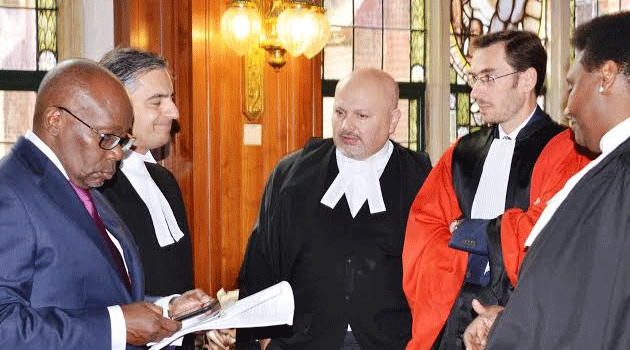
Somalia moved to the ICJ to seek a definition of a boundary stipulated by the United Nations Convention on the Law of the Sea as well as other international sea laws. Photo/COURTESY.
In his concluding submission and response to claims laid by Somalia, Attorney General Githu Muigai on Wednesday said Kenya was acting in “good faith” and in consideration of the neigbouring country’s fragile security and political situation.
“The maritime delimitation between Kenya and Somalia requires sensitive bilateral negotiations that can encompass not strictly legal issues but our also very real political and security concerns as well as practical arrangements to address them,” the court heard.
According to the AG, negotiating the maritime dispute between the two countries would provide a framework that will pay attention to Somalia’s deficient capacity to manage its resources and the eminent threat emanating from the Al Shabaab terror group.
The International Court of Justice (ICJ) heard that Somalia was grappling to gain its political stability and leaving the maritime dispute to be decided by The Hague-based court was likely to overlook other challenges likely to affect the region.
“This maritime boundary dispute arises in a delicate political context. Somalia has only recently begun to emerge from a long period of instability. Somalia has no maritime enforcement capacity. Kenya is deeply concerned about maritime security in the region. Al Shabaab terrorists who exploit the sea for their operations are an ongoing threat to Kenya and its neighbours,” he stated.
Githu stuck to Kenya’s preliminary argument that the maritime case filed by Somalia was inadmissible in cognizant that the controversial Memorandum of Understanding (MoU) signed by the two countries had provided for negotiation as the means of settling the row.
According to Muigai, Kenya was open to negotiate the dispute and has urged the court to leave it to the two countries to resolve the dispute out of court as stipulated in the said MoU.
Prof Vaughan Lowe also told the court that if negotiations failed to provide a solution, there was a provision for Kenya and Somalia to use alternative dispute resolution mechanisms.
It was his submission that Somalia jumped the gun when it moved to the ICJ without giving dialogue a chance.
He further told the court that Kenya’s failure to attend the last meeting did not mean that it had boycotted the negotiation process.
But before Kenya could explain why it didn’t show up, Lowe said Somalia had already moved to the ICJ within 72 hours without even finding out that the Kenyan delegation failed to travel to Mogadishu due to ‘security concerns’.
“It failed to do so in the 72 hours prior to the filing of the application is regrettable. Even if they failed to so afterwards might be accepted as reflection of the state of the bilateral relations that Somalia had so abruptly changed,” he explained.
Kenya completed its second round of oral submissions on Wednesday paving way for Somalia to respond to its application on Friday.
On Tuesday, Somalia accused Kenya of sneaking into the MoU a provision that the maritime dispute would be resolved through negotiations.
It termed Kenya’s intentions as insincere and the main reason why only the ICJ could give them a deserving share of the sea.
Somalia moved to the ICJ to seek a definition of a boundary stipulated by the United Nations Convention on the Law of the Sea as well as other international sea laws.
The bone of contention is about 100,000 square kilometers offshore territory in the Indian Ocean where Somalia and Kenya border each other.
Kenya insists that its boundary lies parallel to the line of latitude giving it the larger share of the maritime region, whereas Somalia is seeking for the extension of the boundary to the southeast – the reason why it moved to the ICJ in 2014.









































